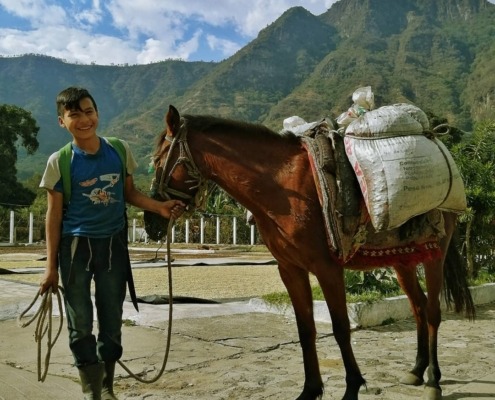Single-origin Microlot Coffee from La Voz cooperative in Guatemala offers a premium experience that stands out in both flavor and value, particularly for specialty coffee consumers and connoisseurs. Here’s an in-depth look at what makes these coffees special, why they command higher prices and the typical U.S. retail prices.
1. Understanding Single-Origin Coffee
- Definition: Single-origin coffee refers to beans sourced from a specific country, region, or even a particular farm. This focus on a single location allows the unique flavors of that area’s terroir (the environmental conditions like soil, altitude, and climate) to shine through.
- Importance for Flavor: Coffees from a single origin, especially from renowned coffee-growing regions like Lake Atitlán, Guatemala, often have distinct flavor notes that reflect the terroir. For instance, La Voz’s beans capture the volcanic soil and high-altitude conditions, leading to rich, complex flavors that would be less pronounced in blended coffees.
2. The Value of Microlot Coffee
- What is a Microlot? Microlots are small, carefully managed lots from a farm, with each batch representing a unique experiment in growing, harvesting, and processing techniques. These coffees are cultivated under specific conditions and are often made up of beans from a single variety, processed in a unique way.
- Enhanced Quality Control: Microlot coffee typically undergoes meticulous care at every stage, from cultivation to processing. This includes hand-picking, precise drying methods, and sometimes unique fermentation processes, all contributing to the coffee’s distinct profile.
- Flavor Complexity: Due to the special attention and tailored processing, microlot coffee often has more nuanced and intense flavors than larger batches. In the case of La Voz, microlots like Bourbon or Maragogipe showcase unique profiles that can range from chocolate and brown sugar to floral and tropical fruit notes.
- Rarity and Exclusivity: Because microlots are small in volume and require labor-intensive processes, they are relatively rare. This exclusivity adds to their value, making them highly sought after by both specialty roasters and consumers.
3. Price Differences and Factors Affecting Premiums
- Production Costs: Microlot coffee requires more labor and precision than regular coffee, which increases its production costs. Workers often hand-pick beans to ensure only the ripest are selected, and processing methods like honey or natural processes are labor-intensive and time-consuming.
- Demand for Unique Coffees: There is a growing market for specialty coffees with distinctive flavors and traceability, especially among U.S. coffee drinkers. The ability to trace the coffee back to a specific cooperative or even a single plot boosts its appeal, as consumers are increasingly drawn to ethical and transparent sourcing.
- Auction Prices: At auctions, the best La Voz microlots often fetch premium prices due to their quality and rarity. Coffees scoring 87+ points can sell for $200–$300 per 100 pounds in green bean form. For particularly rare varieties or unique lots like Maragogipe, prices can reach up to $150 per pound.
4. U.S. Retail Prices for La Voz Single-Origin Microlot Coffee
- Green Beans: For roasters purchasing unroasted beans, La Voz microlots in green form can cost around $6–$10 per pound, depending on the variety, rarity, and the specific auction price achieved. For high-scoring microlots, prices may range from $10 to $15 or more per pound.
- Roasted Coffee Beans: Once roasted, single-origin microlot coffees from La Voz typically retail between $20 and $30 per 12-ounce bag in the U.S. This price accounts for both the original green coffee cost and the additional handling, roasting, and packaging processes. Exceptional microlots or limited-edition batches can even reach $35–$45 per 12-ounce bag, especially when marketed toward specialty coffee enthusiasts.
- Subscription Services and Direct Sales: Many specialty coffee subscription services, like Blue Bottle or Trade Coffee, often feature single-origin and microlot coffees at premium prices, around $25–$35 per 12-ounce bag, with higher prices for rarer, higher-scoring varieties.
5. What Makes La Voz Microlot Coffee Appealing to Consumers?
- Traceability: Coffee from La Voz comes with a story – buyers know the exact origin of the beans and the cooperative’s farming practices. This connection to the source is a significant factor for today’s consumers, who often seek ethically sourced coffee.
- Sustainability and Social Impact: La Voz cooperative operates in alignment with sustainability and fair trade practices, supporting local farmers and the community in San Juan La Laguna. Many buyers are willing to pay higher prices to support these initiatives.
- Superior Quality and Flavor Profile: The microlot coffee’s distinct flavor profile – whether it’s the floral notes in Typica or the rich, chocolatey depth in Bourbon – offers a sensory experience that mass-market coffee simply cannot match. This quality, combined with its exclusivity, makes La Voz microlot coffee a luxury product in the specialty coffee market.
Conclusion
Single-origin microlot coffee from La Voz is a premium product that commands higher prices due to its distinctive flavor profiles, limited availability, and labor-intensive practices that contribute to its exceptional quality. In the U.S., retail prices for these coffees reflect their value, often ranging between $20 and $45 per bag for roasted beans. This investment represents more than just coffee – it’s a commitment to quality, sustainability, and an enhanced coffee-drinking experience.


 Ethical Fashion Guatemala
Ethical Fashion Guatemala